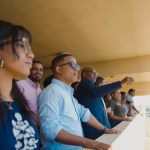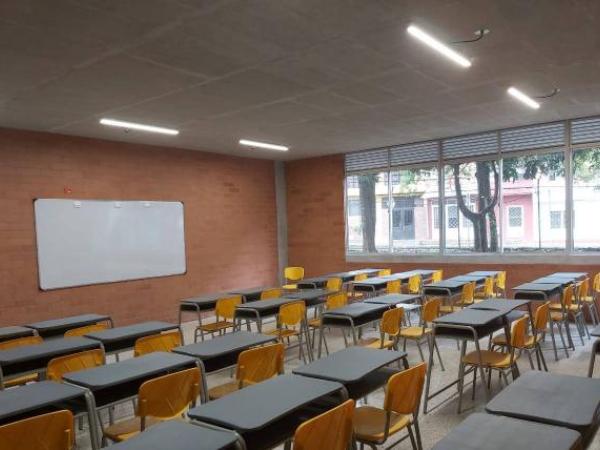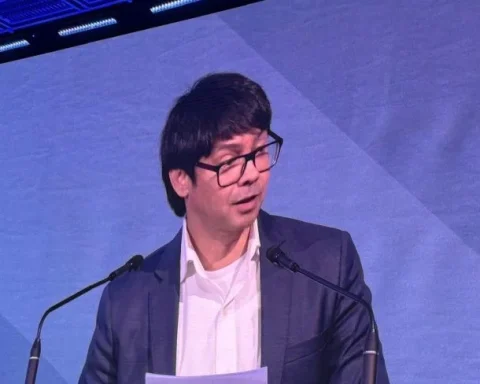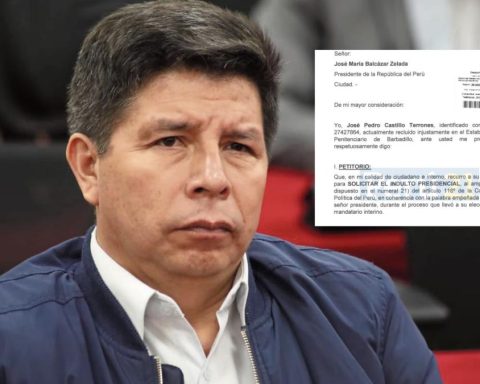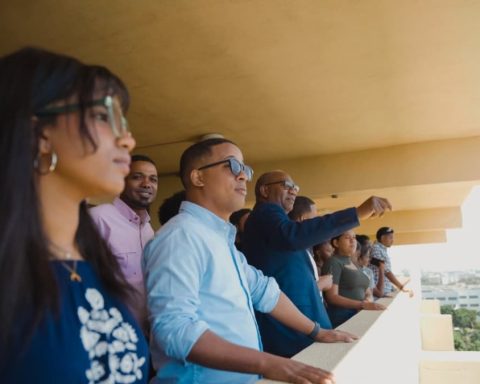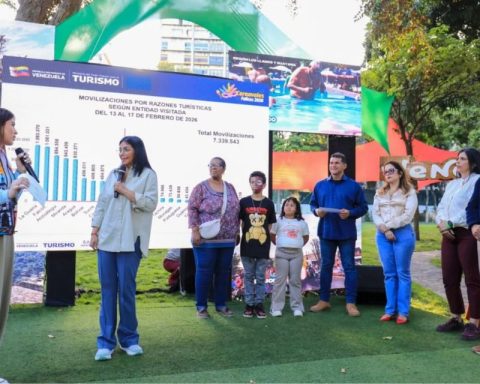Last Friday, April 29, Agnes and Choño got married.
Agnes Thorlacius Nielsen – who had never been married – became a wife at the age of 77, which she only turned on Tuesday, May 3, when the sounds of the cumbias and the guarachas with which they celebrated the link in the Registry were not yet extinguished. Civil of Ancud.
Al Choño, Antonio Díaz Ariu (59), was accompanied by his brothers and he was like a prince with his brand new suit and an impeccable pair of new shoes. The issue of shoes for the groom was what worried Agnes the most a month ago, when we met her and she told us that, after two decades of life together, they would get married, despite the 18 years of age that separate them.
A finishing touch for his other great achievement: the reconstruction of his house in a town in the city. Thanks to a group of volunteers –Acción Solidaria de Ancud–, which mobilized the community, some local businessmen and carried out all kinds of activities to collect funds, the original house, which did not have basic services, was completely rained and literally fell down. to pieces, it was remade in record time. Agnes and Choñito were housed in a small house during the few months that the construction lasted.
Today, Agnes’s house looks much better than a basic dwelling, there, on Río Pudeto street without a number. All covered in tin, it shines on the outside and warmly welcomes on the inside, where there is a bathroom, a good-sized bedroom and a spacious living room with a built-in kitchen, you can see the supportive hand of those who helped this surprising older adult, both for his memory as by his forgetfulness.
He tells us: “The first house was very old. I was dripping. Water fell and wet my bed. When Paulita came, she explained to me that they were going to fix up my little old house and they took us to live somewhere else. In May of last year, one day, at five in the afternoon, they gave me a new one. When we returned with Choñito to receive her, it was full of people outside, who applauded us. Now I am happy, happy. I love my Choñito as if he were my dad. Choñito, come -she says to the dark, skinny, small man, who answers her by shouting, because among many evils, Agnes does not hear with her left ear and sees almost nothing with her right eye, because of the cataracts.
He approaches her and she tells him solemnly in her speech full of diminutives: “I love you very much, little brother, that’s why now we’re going to get married. We have everything ready, little brother. You already have your suit, we only need your new shoes. Give me a little kiss now, that’s how we are, darlings.”
The penguins that she saw
Ruth Caicheo, a social worker in charge of the Home Care Program for the Elderly (PADAM) of the Hogar de Cristo in Ancud, and the social technician who works with her, Fanny Torres, found some white bridal gloves, ideal for Agnes, who came to leave him They are also worried about buying her white tights for the wedding day and thinking of her as a useful wedding gift for both of them and that she likes above all.
Although, in this case, the Hogar de Cristo was not an active part of the reconstruction of her home, they –“Aunt Ruti and Aunt Fanny”, in Agnes’s words– have been a key support in her life since 2017 .
Ruth explains it this way: “I started working at PADAM that year. At that time, the Fraternal Dining Room worked in our facilities, and Agnes and Antonio came for lunch every day. This is how she became a user of our program, we began to visit her and learned about the precarious conditions in which she lived and the abandonment of her closest family group. She then had a brother in a nursing home in Castro, much older than her, who died a couple of years ago. She also has a son, a man who lives in Puerto Natales with whom she has no ties. She talks very little about her family and many details of her previous life are unknown to us.”
PADAM is accompaniment and home care, especially in complex situations. Ruth and Fanny support Agnes and 29 other vulnerable older adults, bringing them food, firewood, cleaning supplies, diapers, as well as accompanying them in procedures and specific needs. The key is accompaniment, helping them alleviate their loneliness and integrating them. “We also generate recreational activities and stimulate the development of links between them, which was greatly altered during the pandemic, but we have had unforgettable moments together: celebrations, artistic presentations and trips,” Ruth lists.
Agnes nods and comments: “I love Aunt Ruti very much; she is like a little sister to me. She once said to me: ‘Agnes, do you want to go to Hogar de Cristo to do nice things for Christmas?’ So we made a lot of pretty ornaments. I also remember when we went for a walk to the Saltos del Petrohué and another time we all got on a big boat to go to the penguin colonies, but Choñito couldn’t come with us. I would like one day to go see all those penguins that I met”.
Those in charge of PADAM do not know details of his biography, but they know everything about his reality, such as the fact that he receives a basic solidarity pension of 140,000 pesos; that, before the reconstruction of the house, he had cut off the water supply due to an unpaid debt with the Essal company; that he did not have any possibility of saving for the house; and that Acción Solidaria’s intervention was “as if Agnes and Choño had received help from a group of superheroes or angels… And now more beautiful things are coming for them,” says Ruth.
You mean marriage. Do you not see any problems with the union, due to the age difference or Choño’s problematic alcohol consumption or both?
Unprejudiced, human, practical, both believe that marriage is the best for both of them, especially for her. Fanny says: “They have known each other for so long, they have lived together for twenty years without problems. They have their ups and downs, like any couple, but they love each other. Choñito helps her a lot: for her to take her medicine, with her diapers, he celebrates her, he accompanies her”.
“It’s time to have a partner”
–I no longer have anyone, anyone, any of my family. They are all dead, mainly dead is my older brother, the Lufo. He was over 109 years old and he died recently, so I was left alone. I have another relative in Castro, but I don’t pay attention to her, because that sister of mine was always very tricky with me. She stuck a broomstick in me here, under her stomach. She was bad, bad. When I was younger I had a son, but he is in Puerto Natales. I haven’t seen him for many years. He will know what he does; he is already of age. I don’t need it, because now I have my own home, my new house, my own family.
This is where memory doesn’t help.
Although many speak of her as “the typical German girl from the countryside who grew up in a boarding school”, Thorlacius Nielsen are not German surnames but Nordic ones. Icelandic and rare in the world, except in Iceland. What’s more: the current Icelandic president is Guðni Thorlacius Jóhannesson. The newlywed Agnes doesn’t care about this fact. She only knows that she was born in Castro, that at one time she lived in the countryside and that she was educated by the Ursuline nuns.
Fanny adds: “Agnes grew up in a home for orphan girls, in the orphanage next to Colegio El Pilar. She was raised by nuns, so she knows how to read and write well, and she recites. She loves it and she does great. In those years it was common for people from the countryside to bring their children to the city and leave them in boarding schools. Some came back to look for them and others not. She grew up there and always had a relationship with the nuns, even as an adult.”
She doesn’t talk about those past times. Or the father of her child. Nor about her adulthood, except when we asked her how she met José Antonio Díaz Ariu. Remember:
–When I was working, up there, in the mountains, where my godfather Yanca, who is already dead, I ran into my Choñito, who was raising a mediagua. He was alone and so was I. There I thought: “It’s time to have a partner to accompany me for the rest of my life.” And so it has been. I love him very much. And now we’re getting married.
–What does Choño work on?
-They look for him to cut firewood, he does any little thing. Now that the weather has turned dizzy, that the sky has left to cry and the rain does not stop, they call him less, but he is determined. He does what he can.
She can do little: she has hip problems, skin problems, deafness, cataracts, and she and her benefactors tell us that she is going to have an operation soon. “I want my eyes fixed, so I can see my people and so I can dance cueca this Eighteenth,” she says. And her future husband encourages her to demonstrate her declamatory skills, which she usually shows off at National Holidays. Without being asked, she stands up and recites with remarkable memory the “Romance de la Niña Criolla”:
“I am a girl with brown skin,
for many suns toast,
people say i have
bright look,
ripe cherry lips,
nightingale in the throat.
As soon as the roosters
proclaim the dawn,
I open my eyes with a blow
and bathe in clear water.
For eighteen I wear
a calico dress,
very white white,
full of pink roses.
And in a Chilean cueca,
I rustle my petticoats.
That I am a firm girl
and Creole with all her soul”.
Agnes bows, bows and enjoys the applause we give her, just as she is grateful for the house they rebuilt for her and the marriage to Choño, which – a month after our visit – is already a reality.










